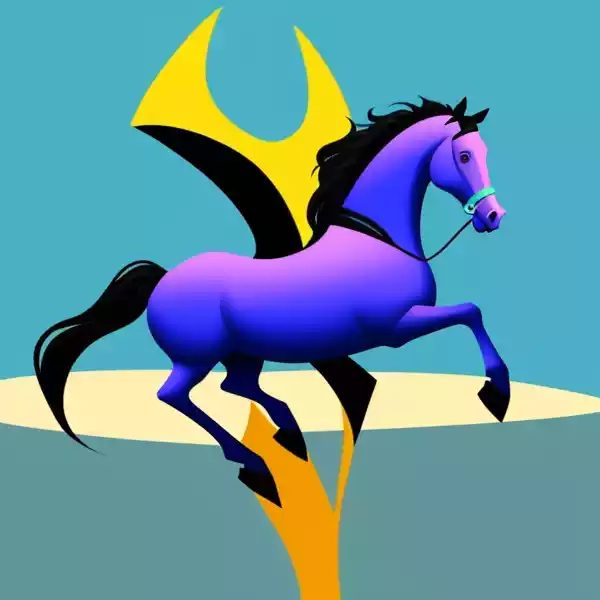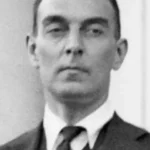 | |
Horseshoes | |
| Author | Ring Lardner |
|---|---|
| Published |
1904
|
| Language | English |
| Nationality | American |
| Genre | Satire |
1904 Short Story
Horseshoes
Horseshoes is an English Satire short story by American writer Ring Lardner. It was first published in 1904.
Horseshoes
by Ring Lardner
THE series ended Tuesday, but I had stayed in Philadelphia an extra day on the chance of there being some follow-up stuff worth sending. Nothing had broken loose; so I filed some stuff about what the Athletics and Giants were going to do with their dough, and then caught the eight o’clock train for Chicago.
Having passed up supper in order to get my story away and grab the train, I went to the buffet car right after I’d planted my grips. I sat down at one of the tables and ordered a sandwich. Four salesmen were playing rum at the other table and all the chairs in the car were occupied; so it didn’t surprise me when somebody flopped down in the seat opposite me.
I looked up from my paper and with a little thrill recognized my companion. Now I’ve been experting round the country with ball players so much that it doesn’t usually excite me to meet one face to face, even if he’s a star. I can talk with Tyrus without getting all fussed up. But this particular player had jumped from obscurity to fame so suddenly and had played such an important though brief part in the recent argument between the Macks and McGraws that I couldn’t help being a little awed by his proximity.
It was none other than Grimes, the utility outfielder Connie had been forced to use in the last game because of the injury to Joyce–Grimes, whose miraculous catch in the eleventh inning had robbed Parker of a home run and the Giants of victory, and whose own homer–a fluky one–had given the Athletics another World’s Championship.
I had met Grimes one day during the spring he was with the Cubs, but I knew he wouldn’t remember me. A ball player never recalls a reporter’s face on less than six introductions or his name on less than twenty. However, I resolved to speak to him, and had just mustered sufficient courage to open a conversation when he saved me the trouble.
“Whose picture have they got there?” he asked, pointing to my paper.
“Speed Parker’s,” I replied.
“What do they say about him? ” asked Grimes. “I’ll read it to you,” I said:
Speed Parker, McGraw’s great third baseman, is ill in a local hospital with nervous prostration, the result of the strain of the World’s Series, in which he played such a stellar rle. Parker is in such a dangerous condition that no one is allowed to see him. Members of the New York team and fans from Gotham called at the hospital to-day, but were unable to gain admittance to his ward. Philadelphians hope he will recover speedily and will suffer no permanent ill effects from his sickness, for he won their admiration by his work in the series, though he was on a rival team. A lucky catch by Grimes, the Athletics’ substitute outfielder, was all that prevented Parker from winning the title for New York. According to Manager Mack, of the champions, the series would have been over in four games but for Parker’s wonderful exhibition of nerve and—-“
“That’ll be a plenty,” Grimes interrupted. “And that’s just what you might expect from one o’ them doughheaded reporters. If all the baseball writers was where they belonged they’d have to build an annex to Matteawan.”
I kept my temper with very little effort–it takes more than a peevish ball player’s remarks to insult one of our fraternity; but I didn’t exactly understand his peeve.
“Doesn’t Parker deserve the bouquet?” I asked.
“Oh, they can boost him all they want to,” said Grimes; “but when they call that catch lucky and don’t mention the fact that Parker is the luckiest guy in the world, somethin’ must be wrong with ’em. Did you see the serious?”
“No,” I lied glibly, hoping to draw from him the cause of his grouch.
“Well,” he said, “you sure missed somethin’. They never was a serious like it before and they won’t never be one again. It went the full seven games and every game was a bear. They was one big innin’ every day and Parker was the big cheese in it. Just as Connie says, the Ath-a-letics would of cleaned ’em in four games but for Parker; but it wasn’t because he’s a great ball player–it was because he was born with a knife, fork and spoon in his mouth, and a rabbit’s foot hung round his neck.
“You may not know it, but I’m Grimes, the guy that made the lucky catch. I’m the guy that won the serious with a hit–a home-run hit; and I’m here to tell you that if I’d had one-tenth o’ Parker’s luck they’d of heard about me long before yesterday. They say my homer was lucky. Maybe it was; but, believe me, it was time things broke for me. They been breakin’ for him all his life.”
“Well,” I said, “his luck must have gone back on him if he’s in a hospital with nervous prostration.”
“Nervous prostration nothin’,” said Grimes. “He’s in a hospital because his face is all out o’ shape and he’s ashamed to appear on the street. I don’t usually do so much talkin’ and I’m ravin’ a little to-night because I’ve had a couple o’ drinks; but—-“
“Have another,” said I, ringing for the waiter, “and talk some more.”
“I made two hits yesterday,” Grimes went on, “but the crowd only seen one. I busted up the game and the serious with the one they seen. The one they didn’t see was the one I busted up a guy’s map with–and Speed Parker was the guy. That’s why he’s in a hospital. He may be able to play ball next year; but I’ll bet my share o’ the dough that McGraw won’t reco’nize him when he shows up at Marlin in the spring.”
“When did this come off?” I asked. “And why?”
“It come off outside the clubhouse after yesterday’s battle,” he said; ” and I hit him because he called me a name–a name I won’t stand for from him.”
“What did he call you?” I queried, expecting to hear one of the delicate epithets usually applied by conquered to conqueror on the diamond.
“‘Horseshoes!'” was Grimes’ amazing reply.
“But, good Lord!” I remonstrated, “I’ve heard of ball players calling each other that, and Lucky Stiff, and Fourleaf Clover, ever since I was a foot high, and I never knew them to start fights about it.”
“Well,” said Grimes, “I might as well give you all the dope; and then if you don’t think I was justified I’ll pay your fare from here to wherever you’re goin’. I don’t want you to think I’m kickin’ about trifles–or that I’m kickin’ at all, for that matter. I just want to prove to you that he didn’t have no license to pull that Horseshoes stuff on me and that I only give him what was comin’ to him.”
“Go ahead and shoot,” said I.
“Give us some more o’ the same,” said Grimes to the passing waiter. And then he told me about it.
Maybe you’ve heard that me and Speed Parker was raised in the same town–Ishpeming, Michigan. We was kids together, and though he done all the devilment I got all the lickin’s. When we was about twelve years old Speed throwed a rotten egg at the teacher and I got expelled. That made me sick o’ schools and I wouldn’t never go to one again, though my ol’ man beat me up and the truant officers threatened to have me hung.
Well, while Speed was learnin’ what was the principal products o’ New Hampshire and Texas I was workin’ round the freight-house and drivin’ a dray.
We’d both been playin’ ball all our lives; and when the town organized a semi-pro club we got jobs with it. We was to draw two bucks apiece for each game and they played every Sunday. We played four games before we got our first pay. They was a hole in my pants pocket as big as the home plate, but I forgot about it and put the dough in there. It wasn’t there when I got home. Speed didn’t have no hole in his pocket–you can bet on that! Afterward the club hired a good outfielder and I was canned. They was huntin’ for another third baseman too; but, o’ course, they didn’t find none and Speed held his job.
The next year they started the Northern Peninsula League. We landed with the home team. The league opened in May and blowed up the third week in June. They paid off all the outsiders first and then had just money enough left to settle with one of us two Ishpeming guys. The night they done the payin’ I was out to my uncle’s farm, so they settled with Speed and told me I’d have to wait for mine. I’m still waitin’!
Gene Higgins, who was manager o’ the Battle Creek Club, lived in Houghton, and that winter we goes over and strikes him for a job. He give it to us and we busted in together two years ago last spring.
I had a good year down there. I hit over .300 and stole all the bases in sight. Speed got along good too, and they was several big-league scouts lookin’ us over. The Chicago Cubs bought Speed outright and four clubs put in a draft for me. Three of ’em–Cleveland and the New York Giants and the Boston Nationals–needed outfielders bad, and it would of been a pipe for me to of made good with any of ’em. But who do you think got me? The same Chicago Cubs; and the only outfielders they had at that time was Schulte and Leach and Good and Williams and Stewart, and one or two others.
Well, I didn’t figure I was any worse off than Speed. The Cubs had Zimmerman at third base and it didn’t look like they was any danger of a busher beatin’ him out; but Zimmerman goes and breaks his leg the second day o’ the season–that’s a year ago last April–and Speed jumps right in as a regular. Do you think anything like that could happen to Schulte or Leach, or any o’ them outfielders? No, sir! I wore out my uniform slidin’ up and down the bench and wonderin’ whether they’d ship me to Fort Worth or Siberia.
Now I want to tell you about the miserable luck Speed had right off the reel. We was playin’ at St. Louis. They had a one-run lead in the eighth, when their pitcher walked Speed with one out. Saier hits a high fly to centre and Parker starts with the crack o’ the bat. Both coachers was yellin’ at him to go back, but he thought they was two out and he was clear round to third base when the ball come down. And Oakes muffs it! O’ course he scored and the game was tied up.
Parker come in to the bench like he’d did something wonderful.
“Did you think they was two out?” ast Hank.
“No,” says Speed, blushin’.
“Then what did you run for?” says Hank.
“I had a hunch he was goin’ to drop the ball,” says Speed; and Hank pretty near falls off the bench.
The next day he come up with one out and the sacks full, and the score tied in the sixth. He smashes one on the ground straight at Hauser and it looked like a cinch double play; but just as Hauser was goin’ to grab it the ball hit a rough spot and hopped a mile over his head. It got between Oakes and Magee and went clear to the fence. Three guys scored and Speed pulled up at third. The papers come out and said the game was won by a three-bagger from the bat o’ Parker, the Cubs’ sensational kid third baseman. Gosh!
We go home to Chi and are havin’ a hot battle with Pittsburgh. This time Speed’s turn come when they was two on and two out, and Pittsburgh a run to the good–I think it was the eighth innin’. Cooper gives him a fast one and he hits it straight up in the air. O’ course the runners started goin’, but it looked hopeless because they wasn’t no wind or high sky to bother anybody. Mowrey and Gibson both goes after the ball; and just as Mowrey was set for the catch Gibson bumps into him and they both fall down. Two runs scored and Speed got to second. Then what does he do but try to steal third–with two out too! And Gibson’s peg pretty near hits the left field seats on the fly.
When Speed comes to the bench Hank says:
“If I was you I’d quit playin’ ball and go to Monte Carlo.”
“What for?” says Speed.
“You’re so dam’ lucky!” says Hank.
“So is Ty Cobb,” says Speed. That’s how he hated himself!
First trip to Cincy we run into a couple of old Ishpeming boys. They took us out one night, and about twelve o’clock I said we’d have to go back to the hotel or we’d get fined. Speed said I had cold feet and he stuck with the boys. I went back alone and Hank caught me comin’ in and put a fifty-dollar plaster on me. Speed stayed out all night long and Hank never knowed it. I says to myself: “Wait till he gets out there and tries to play ball without no sleep!” But the game that day was called off on account o’ rain. Can you beat it?
I remember what he got away with the next afternoon the same as though it happened yesterday. In the second innin’ they walked him with nobody down, and he took a big lead off first base like he always does. Benton throwed over there three or four times to scare him back, and the last time he throwed, Hobby hid the ball. The coacher seen it and told Speed to hold the bag; but he didn’t pay no attention. He started leadin’ right off again and Hobby tried to tag him, but the ball slipped out of his hand and rolled about a yard away. Parker had plenty o’ time to get back; but, instead o’ that, he starts for second. Hobby picked up the ball and shot it down to Groh–and Groh made a square muff.
Parker slides into the bag safe and then gets up and throws out his chest like he’d made the greatest play ever. When the ball’s throwed back to Benton, Speed leads off about thirty foot and stands there in a trance. Clarke signs for a pitch-out and pegs down to second to nip him. He was caught flatfooted–that is, he would of been with a decent throw; but Clarke’s peg went pretty near to Latonia. Speed scored and strutted over to receive our hearty congratulations. Some o’ the boys was laughin’ and he thought they was laughin’ with him instead of at him.
It was in the ninth, though, that he got by with one o’ the worst I ever seen. The Reds was a run behind and Marsans was on third base with two out. Hobby, I think it was, hit one on the ground right at Speed and he picked it up clean. The crowd all got up and started for the exits. Marsans run toward the plate in the faint hope that the peg to first would be wild. All of a sudden the boys on the Cincy bench begun yellin’ at him to slide, and he done so. He was way past the plate when Speed’s throw got to Archer. The bonehead had shot the ball home instead o’ to first base, thinkin’ they was only one down. We was all crazy, believin’ his nut play had let ’em tie it up; but he comes tearin’ in, tellin’ Archer to tag Marsans. So Jim walks over and tags the Cuban, who was brushin’ off his uniform.
“You’re out!”says Klem. “You never touched the plate.”
I guess Marsans knowed the umps was right because he didn’t make much of a holler. But Speed sure got a pannin’ in the club-house.
“I suppose you knowed he was goin’ to miss the plate!” says Hank sarcastic as he could.
Everybody on the club roasted him, but it didn’t do no good.
Well, you know what happened to me. I only got into one game with the Cubs–one afternoon when Leach was sick. We was playin’ the Boston bunch and Tyler was workin’ against us. I always had trouble with lefthanders and this was one of his good days. I couldn’t see what he throwed up there. I got one foul durin’ the afternoon’s entertainment; and the wind was blowin’ a hundred-mile gale, so that the best outfielder in the world couldn’t judge a fly ball. That Boston bunch must of hit fifty of ’em and they all come to my field.
If I caught any I’ve forgot about it. Couple o’ days after that I got notice o’ my release to Indianapolis.
Parker kept right on all season doin’ the blamnedest things you ever heard of and gettin’ by with ’em. One o’ the boys told me about it later. If they was playin’ a double-header in St. Louis, with the thermometer at 130 degrees, he’d get put out by the umps in the first innin’ o’ the first game. If he started to steal the catcher’d drop the pitch or somebody’d muff the throw. If he hit a pop fly the sun’d get in somebody’s eyes. If he took a swell third strike with the bases full the umps would call it a ball. If he cut first base by twenty feet the umps would be readin’ the mornin’ paper.
Zimmerman’s leg mended, so that he was all right by June; and then Saier got sick and they tried Speed at first base. He’d never saw the bag before; but things kept on breakin’ for him and he played it like a house afire. The Cubs copped the pennant and Speed got in on the big dough, besides playin’ a whale of a game through the whole serious.
Speed and me both went back to Ishpeming to spend the winter–though the Lord knows it ain’t no winter resort. Our homes was there; and besides, in my case, they was a certain girl livin’ in the old burg.
Parker, o’ course, was the hero and the swell guy when we got home. He’d been in the World’s Serious and had plenty o’ dough in his kick. I come home with nothin’ but my suitcase and a hard-luck story, which I kept to myself. I hadn’t even went good enough in Indianapolis to be sure of a job there again.
That fall–last fall–an uncle o’ Speed’s died over in the Soo and left him ten thousand bucks. I had an uncle down in the Lower Peninsula who was worth five times that much–but he had good health!
This girl I spoke about was the prettiest thing I ever see. I’d went with her in the old days, and when I blew back I found she was still strong for me. They wasn’t a great deal o’ variety in Ishpeming for a girl to pick from. Her and I went to the dance every Saturday night and to church Sunday nights. I called on her Wednesday evenin’s, besides takin’ her to all the shows that come along–rotten as the most o’ them was.
I never knowed Speed was makin’ a play for this doll till along last Feb’uary. The minute I seen what was up I got busy. I took her out sleigh-ridin’ and kept her out in the cold till she’d promised to marry me. We set the date for this fall–I figured I’d know better where I was at by that time.
Well, we didn’t make no secret o’ bein’ engaged; down in the poolroom one night Speed come up and congratulated me. He says:
“You got a swell girl, Dick! I wouldn’t mind bein’ in your place. You’re mighty lucky to cop her out–you old Horseshoes, you!”
“Horseshoes!” I says. “You got a fine license to call anybody Horseshoes! I suppose you ain’t never had no luck?”
“Not like you,” he says.
I was feelin’ too good about grabbin’ the girl to get sore at the time; but when I got to thinkin’ about it a few minutes afterward it made me mad clear through. What right did that bird have to talk about me bein’ lucky?
Speed was playin’ freeze-out at a table near the door, and when I started home some o’ the boys with him says:
“Good night, Dick.”
I said good night and then Speed looked up.
“Good night, Horseshoes!”he says.
That got my nanny this time.
“Shut up, you lucky stiff!” I says. “If you wasn’t so dam’ lucky you’d be sweepin’ the streets.” Then I walks on out.
I was too busy with the girl to see much o’ Speed after that. He left home about the middle o’ the month to go to Tampa with the Cubs. I got notice from Indianapolis that I was sold to Baltimore. I didn’t care much about goin’ there and I wasn’t anxious to leave home under the circumstances, so I didn’t report till late.
When I read in the papers along in April that Speed had been traded to Boston for a couple o’ pitchers I thought: “Gee! He must of lost his rabbit’s foot!” Because, even if the Cubs didn’t cop again, they’d have a city serious with the White Sox and get a bunch o’ dough that way. And they wasn’t no chance in the world for the Boston Club to get nothin’ but their salaries.
It wasn’t another month, though, till Shafer, o’ the Giants, quit baseball and McGraw was up against it for a third baseman. Next thing I knowed Speed was traded to New York and was with another winner–for they never was out o’ first place all season.
I was gettin’ along all right at Baltimore and Dunnie liked me; so I felt like I had somethin’ more than just a one-year job–somethin’ I could get married on. It was all framed that the weddin’ was comin’ off as soon as this season was over; so you can believe I was pullin’ for October to hurry up and come.
One day in August, two months ago, Dunnie come in the club-house and handed me the news.
“Rube Oldring’s busted his leg,” he says, “and he’s out for the rest o’ the season. Connie’s got a youngster named Joyce that he can stick in there, but he’s got to have an extra outfielder. He’s made me a good proposition for you and I’m goin’ to let you go. It’ll be pretty soft for yQu, because they got the pennant cinched and they’ll cut you in on the big money.”
“Yes,” I says; “and when they’re through with me they’ll ship me to Hellangone, and I’ll be draggin’ down about seventy-five bucks a month next year.”
“Nothin’ like that,” says Dunnie. “If he don’t want you next season he’s got to ask for waivers; and if you get out o’ the big league you come right back here. That’s all framed.”
So that’s how I come to get with the Ath-a-letics. Connie give me a nice, comf’table seat in one corner o’ the bench and I had the pleasure o’ watchin’ a real ball club perform once every afternoon and sometimes twice.
Connie told me that as soon as they had the flag cinched he was goin’ to lay off some o’ his regulars and I’d get a chance to play.
Well, they cinched it the fourth day o’ September and our next engagement was with Washin’ton on Labor Day. We had two games and I was in both of ’em. And I broke in with my usual lovely luck, because the pitchers I was ast to face was Boehling, a nasty lefthander, and this guy Johnson.
The mornin’ game was Boebling’s and he wasn’t no worse than some o’ the rest of his kind. I only whiffed once and would of had a triple if Milan hadn’t run from here to New Orleans and stole one off me.
I’m not boastin’ about my first experience with Johnson though. They can’t never tell me he throws them balls with his arm. He’s got a gun concealed about his person and he shoots ’em up there. I was leadin’ off in Murphy’s place and the game was a little delayed in startin’, because I’d watched the big guy warm up and wasn’t in no hurry to get to that plate. Before I left the bench Connie says:
Don’t try to take no healthy swing. Just meet ’em and you’ll get a long better.”
So I tried to just meet the first one he throwed; but when I stuck out my bat Henry was throwin’ the pill back to Johnson. Then I thought Maybe if I start swingin’ now at the second one I’ll hit the third one. So I let the second one come over and the umps guessed it was another strike, though I’ll bet a thousand bucks he couldn’t see it no more’n I could.
While Johnson was still windin’ up to pitch again I started to swing–and the big cuss crosses me with a slow one. I lunged at it twice and missed it both times, and the force o’ my wallop throwed me clean back to the bench. The Ath-a-letics was all laughin’ at me and I laughed too, because I was glad that much of it was over.
McInnes gets a base hit off him in the second innin’ and I ast him how he done it.
“He’s a friend o’ mine,” says Jack, “and he lets up when he pitches to me.”
I made up my mind right there that if I was goin’ to be in the league next year I’d go out and visit Johnson this winter and get acquainted.
I wished before the day was over that I was hittin’ in the catcher’s place, because the fellers down near the tail-end of the battin’ order only had to face him three times. He fanned me on three pitched balls again in the third, and when I come up in the sixth he scared me to death by pretty near beanin’ me with the first one.
“Be careful!” says Henry. “He’s gettin’ pretty wild and he’s liable to knock you away from your uniform.”
“Don’t he never curve one?”I ast.
“Sure!” says Henry. “Do you want to see his curve?”
“Yes,” I says, knowin’ the hook couldn’t be no worse’n the fast one.
So he give me three hooks in succession and I missed ’em all; but I felt more comf’table than when I was duckin’ his fast ball. In the ninth he hit my bat with a curve and the ball went on the ground to McBride. He booted it, but throwed me out easy–because I was so surprised at not havin’ whiffed that I forgot to run!
Well, I went along like that for the rest o’ the season, runnin’ up against the best pitchers in the league and not exactly murderin’ ’em. Everything I tried went wrong, and I was smart enough to know that if anything had depended on the games I wouldn’t of been in there for two minutes. Joyce and Strunk and Murphy wasn’t jealous o’ me a bit; but they was glad to take turns restin’, and I didn’t care much how I went so long as I was sure of a job next year.
I’d wrote to the girl a couple o’ times askin’ her to set the exact date for our weddin’; but she hadn’t paid no attention. She said she was glad I was with the Ath-a-letics, but she thought the Giants was goin’ to beat us. I might of suspected from that that somethin’ was wrong, because not even a girl would pick the Giants to trim that bunch of ourn. Finally, the day before the serious started, I sent her a kind o’ sassy letter sayin’ I guessed it was up to me to name the day, and askin’ whether October twentieth was all right. I told her to wire me yes or no.
I’d been readin’ the dope about Speed all season, and I knowed he’d had a whale of a year and that his luck was right with him; but I never dreamed a man could have the Lord on his side as strong as Speed did in that World’s Serious! I might as well tell you all the dope, so long as you wasn’t there.
The first game was on our grounds and Connie give us a talkin’ to in the clubhouse beforehand.
“The shorter this serious is,” he says, “the better for us. If it’s a long serious we’re goin’ to have trouble, because McGraw’s got five pitchers he can work and we’ve got about three; so I want you boys to go at ’em from the jump and play ’em off their feet. Don’t take things easy, because it ain’t goin’ to be no snap. Just because we’ve licked ’em before ain’t no sign we’ll do it this time.”
Then he calls me to one side and ast me what I knowed about Parker.
“You was with the Cubs when he was, wasn’t you?” he says.
“Yes,” I says; “and he’s the luckiest stiff you ever seen! If he got stewed and fell in the gutter he’d catch a fish.”
“I don’t like to hear a good ball player called lucky,” says Connie. “He must have a lot of ability or McGraw wouldn’t use him regular. And he’s been hittin’ about .340 and played a hang-up game at third base. That can’t be all luck.”
“Wait till you see him,” I says; “and if you don’t say he’s the luckiest guy in the world you can sell me to the Boston Bloomer Girls. He’s so lucky,” I says, “that if they traded him to the St. Louis Browns they’d have the pennant cinched by the Fourth o’ July.”
And I’ll bet Connie was willin’ to agree with me before it was over.
Well, the Chief worked against the Big Rube in that game. We beat ’em, but they give us a battle and it was Parker that made it close. We’d gone along nothin’ and nothin’ till the seventh, and then Rube walks Collins and Baker lifts one over that little old wall. You’d think by this time them New York pitchers would know better than to give that guy anything he can hit.
In their part o’ the ninth the Chief still had ’em shut out and two down, and the crowd was goin’ home; but Doyle gets hit in the sleeve with a pitched ball and it’s Speed’s turn. He hits a foul pretty near straight up, but Schang misjudges it. Then he lifts another one and this time McInnes drops it. He’d ought to of been out twice. The Chief tries to make him hit at a bad one then, because he’d got him two strikes and nothin’. He hit at it all right–kissed it for three bases between Strunk and Joyce! And it was a wild pitch that he hit. Doyle scores, o’ course, and the bugs suddenly decide not to go home just yet. I fully expected to see him steal home and get away with it, but Murray cut into the first ball and lined out to Barry.
Plank beat Matty two to one the next day in New York, and again Speed and his rabbit’s foot give us an awful argument. Matty wasn’t so good as usual and we really ought to of beat him bad. Two different times Strunk was on second waitin’ for any kind o’ wallop, and both times Barry cracked ’em down the third-base line like a shot. Speed stopped the first one with his stomach and extricated the pill just in time to nail Barry at first base and retire the side. The next time he throwed his glove in front of his face in self-defense and the ball stuck in it.
In the sixth innin’ Schang was on third base and Plank on first, and two down, and Murphy combed an awful one to Speed’s left. He didn’t have time to stoop over and he just stuck out his foot. The ball hit it and caromed in two hops right into Doyle’s hands on second base before Plank got there. Then in the seventh Speed bunts one and Baker trips and falls goin’ after it or he’d of threw him out a mile. They was two gone; so Speed steals second, and, o’ course, Schang has to make a bad peg right at that time and lets him go to third. Then Collins boots one on Murray and they’ve got a run. But it didn’t do ’em no good, because Collins and Baker and McInnes come up in the ninth and walloped ’em where Parker couldn’t reach ’em.
Comin’ back to Philly on the train that night, I says to Connie:
“What do you think o’ that Parker bird now?”
“He’s lucky, all right,” says Connie smilin’; “but we won’t hold it against him if he don’t beat us with it.”
“It ain’t too late,” I says. “He ain’t pulled his real stuff yet.”
The whole bunch was talkin’ about him and his luck, and sayin’ it was about time for things to break against him. I warned ’em that they wasn’t no chance–that it was permanent with him.
Bush and Tesreau hooked up next day and neither o’ them had much stuff. Everybody was hittin’ and it looked like anybody’s game right up to the ninth. Speed had got on every time he come up–the wind blowin’ his fly balls away from the outfielders and the infielders bootin’ when he hit ’em on the ground.
When the ninth started the score was seven apiece. Connie and McGraw both had their whole pitchin’ staffs warmin’ up. The crowd was wild, because they’d been all kinds of action. They wasn’t no danger of anybody’s leavin’ their seats before this game was over.
Well, Bescher is walked to start with and Connie’s about ready to give Bush one hook; but Doyle pops out tryin’ to bunt. Then Speed gets two strikes and two balls, and it looked to me like the next one was right over the heart; but Connolly calls it a ball and gives him another chance. He whales the groove ball to the fence in left center and gets round to third on it, while Bescher scores. Right then Bush comes out and the Chief goes in. He whiffs Murray and has two strikes on Merkle when Speed makes a break for home–and, o’ course, that was the one ball Schang dropped in the whole serious!
They had a two-run lead on us then and it looked like a cinch for them to hold it, because the minute Tesreau showed a sign o’ weakenin’ McGraw was sure to holler for Matty or the Rube. But you know how quick that bunch of ourn can make a two-run lead look sick. Before McGraw could get Jeff out o’ there we had two on the bases.
Then Rube comes in and fills ’em up by walkin’ Joyce. It was Eddie’s turn to wallop and if he didn’t do nothin’ we had Baker comin’ up next. This time Collins saved Baker the trouble and whanged one clear to the woods. Everybody scored but him–and he could of, too, if it’d been necessary.
In the clubhouse the boys naturally felt pretty good. We’d copped three in a row and it looked like we’d make it four straight, because we had the Chief to send back at ’em the followin’ day.
“Your friend Parker is lucky,” the boys says to me, “but it don’t look like he could stop us now.”
I felt the same way and was consultin’ the time-tables to see whether I could get a train out o’ New York for the West next evenin’. But do you think Speed’s luck was ready to quit? Not yet! And it’s a wonder we didn’t all go nuts durin’ the next few days. If words could kill, Speed would of died a thousand times. And I wish he had!
They wasn’t no record-breakin’ crowd out when we got to the Polo Grounds. I guess the New York bugs was pretty well discouraged and the bettin’ was eight to five that we’d cop that battle







